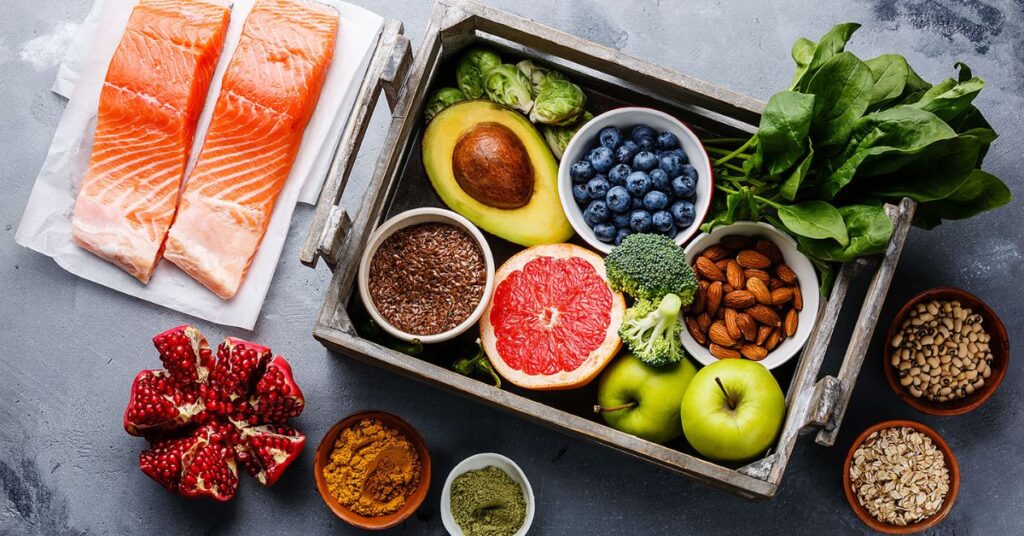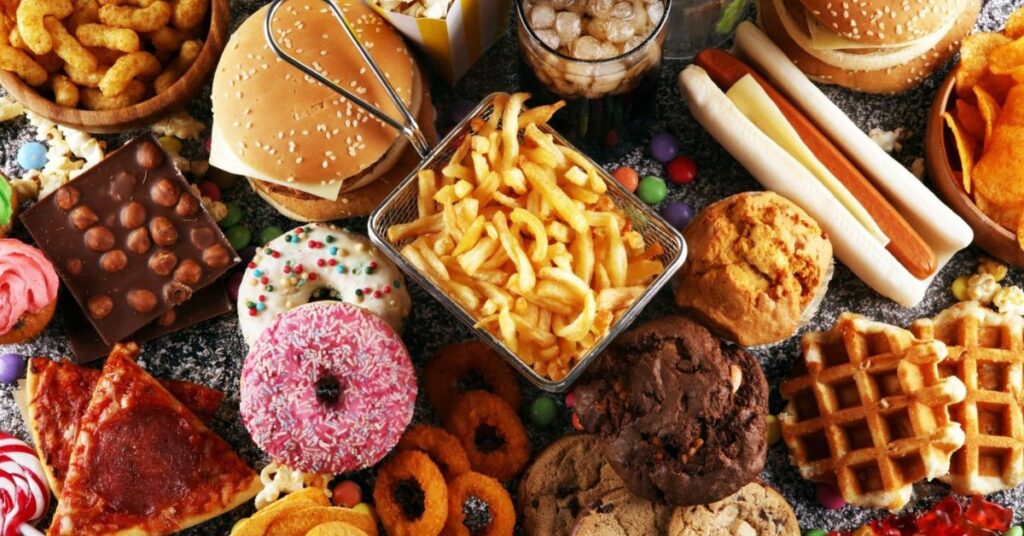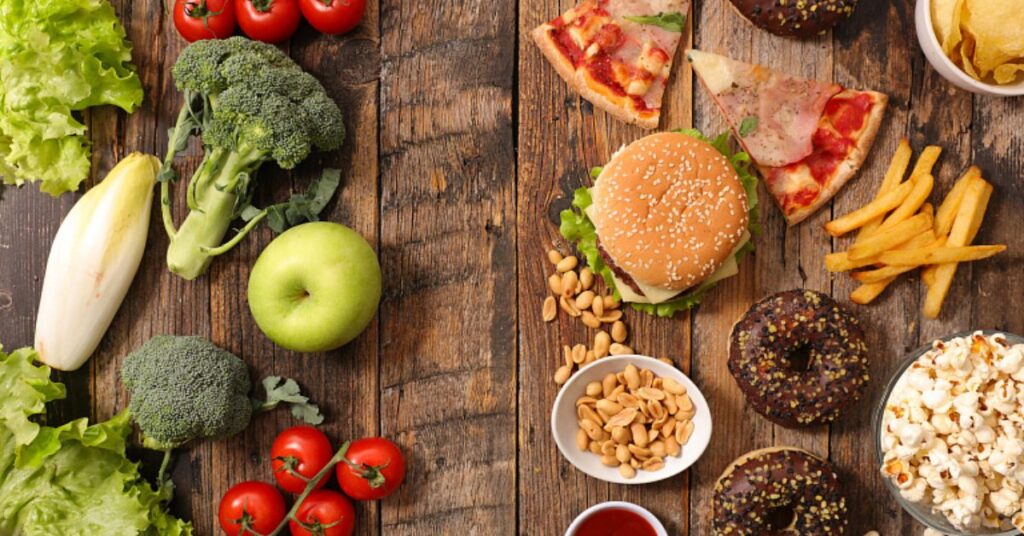Eating well is vital for living a healthy lifestyle. Every day, we make dietary choices that impact our bodies and minds. The contrast between healthy foods and unhealthy foods is clear. Healthy eating habits boost energy, prevent chronic diseases, and improve overall well-being. Meanwhile, junk food and high-calorie foods can harm our health over time.
Understanding the nutritional content of what we eat helps us make informed decisions. This guide explores the key differences, benefits, and risks associated with different types of food. It also suggests simple ways to replace processed items with whole foods for a healthier life.
What Are Healthy Foods?

Healthy foods are those that provide the body with essential nutrients for growth and repair. These include whole grains, fruits, vegetables, lean proteins, and low-fat dairy products. Their high nutritional value supports a balanced diet. For example, spinach is rich in iron and vitamin C, while salmon provides omega-3 fatty acids for heart health.
Unlike processed foods, nutrient-rich food contains natural vitamins and minerals. These foods are energy-boosting and aid in weight management. Incorporating them into meals reduces the risk of cardiovascular diseases, diabetes, and other chronic diseases. Choosing fresh, organic food over packaged items is a step toward a healthy lifestyle.
You May Also Read This Article: How to Build a Growth Mindset: Strategies, Myths, and Realities
What Are Unhealthy Foods?

Unhealthy foods, often referred to as junk food, are low in nutritional value but high in calories, sugar, or bad fats like trans fats and saturated fats. Examples include sugary sodas, fried chicken, and packaged snacks. These foods lack essential nutrients and can increase the risk of obesity, diabetes, and heart health problems.
Consumption of high-calorie foods in excess leads to a higher caloric intake than the body needs. This often results in weight gain and metabolic disorders. Unlike whole foods, these options are often loaded with preservatives and artificial additives. Limiting fast food consumption is key to avoiding harmful effects on long-term health.
Why Are Certain Foods Unhealthy?
The ingredients and preparation methods of processed foods contribute to their negative impact. Trans fat and excessive sodium in these items can increase blood pressure and cholesterol levels, leading to cardiovascular diseases. Their high sugar content also leads to energy crashes and poor energy levels.
In contrast, healthy foods promote stable energy. For instance, an apple provides natural sugars and fiber, while a donut offers only empty calories. The lack of fiber, vitamins, and good fats in unhealthy foods makes them unsustainable for a healthy lifestyle.
Key Differences Between Healthy and Unhealthy Foods
Energy and Nutritional Content
Healthy foods provide balanced energy and essential nutrients, while unhealthy foods are calorie-dense but lack nutrients. A study comparing grilled chicken salad (rich in protein and fiber) with fries (high in trans fats) highlights this gap. The table below illustrates the difference:
| Food Type | Calories | Nutritional Value | Health Impact |
| Grilled Chicken Salad | 250 | High in protein, fiber | Promotes heart health |
| French Fries | 400 | Low in nutrients | Contributes to obesity |
Taste and Appeal
The taste of junk food often comes from added sugars, salts, and artificial flavors. While these are appealing initially, they can be addictive. In contrast, nutrient-rich foods like a fresh mango or roasted almonds offer natural flavors that satisfy cravings sustainably.
Consumption Patterns
Frequent consumption of unhealthy foods is linked to poor health outcomes, while deliberate efforts to include whole foods result in better overall health. Studies show that increasing the intake of energy-boosting foods reduces cravings for processed foods.
Benefits of Eating Healthy
Choosing a healthy diet has numerous benefits. It improves energy levels, supports mental clarity, and aids in weight management. A diet rich in whole grains, lean proteins, and vegetables strengthens immunity and reduces health risks.
Long-term benefits include lower chances of chronic diseases such as diabetes and hypertension. For example, replacing white bread with whole-grain alternatives enhances digestion and promotes stable blood sugar levels.
Foods That Are Bad for Your Health
Certain foods pose significant health risks when consumed regularly. These include sugary drinks, fried snacks, and pastries loaded with saturated fat and refined sugar. For instance, a single can of soda contains about 10 teaspoons of sugar, contributing to a high caloric intake and poor weight management.
Fast foods like burgers and fries are convenient but loaded with trans fats and sodium, increasing the risk of cardiovascular diseases. Avoiding such options is essential for maintaining a healthy lifestyle.
Healthy Alternatives to Junk Foods

Replacing junk food with nutrient-rich foods is easier than it seems. Swapping soda for herbal tea or water infused with fruit is a simple step. Instead of potato chips, baked kale chips offer crunch and flavor. Similarly, frozen yogurt or fruit sorbets make excellent alternatives to ice cream.
| Junk Food | Healthy Alternative |
| Soda | Water with lemon or mint |
| Potato Chips | Baked sweet potato slices |
| Candy Bars | Dark chocolate with nuts |
Conclusion
Understanding the distinction between healthy foods and unhealthy foods empowers you to make better choices. Prioritizing nutrient-rich foods and reducing fast food consumption can lead to a healthier, more fulfilling life. Remember, small changes today pave the way for long-term benefits in your health journey.
By making informed dietary choices, you not only improve your physical well-being but also your mental health and energy. Start by adding more whole foods to your meals, and gradually phase out processed items for sustainable, lifelong health improvements.
FAQ’s
What are healthy foods?
Healthy foods include whole grains, fruits, vegetables, lean proteins, and low-fat dairy products.
Why are processed foods considered unhealthy?
Processed foods often contain trans fats, high sugar levels, and low nutritional value, which can harm health.
How can I switch to healthy eating?
Start by replacing junk food with nutrient-rich alternatives like fruits, whole grains, and lean proteins.
What are the benefits of eating healthy foods?
Healthy eating improves energy levels, supports weight management, and reduces the risk of chronic diseases.
Are all fats bad for you?
No, good fats like those in avocados and nuts are beneficial, while trans and saturated fats should be limited.







